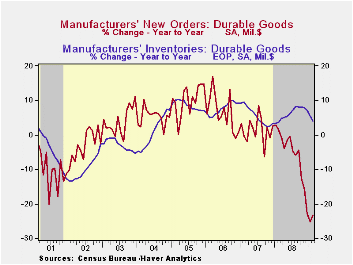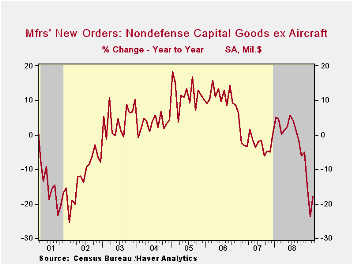 Global| Mar 25 2009
Global| Mar 25 2009Rise in U.S. Durable Goods Orders Surprises
by:Tom Moeller
|in:Economy in Brief
Summary
New orders for durable goods rose a surprising 3.4% last month after a revised 7.3% January decline that was deeper than reported initially. Despite the latest increase, new orders have fallen by roughly one quarter since the middle [...]

New orders for durable goods rose a surprising 3.4% last month after a revised 7.3% January decline that was deeper than reported initially. Despite the latest increase, new orders have fallen by roughly one quarter since the middle of last year; however, downward momentum in the level of bookings may have slackened. The latest increase compared to Consensus expectations for a 2.3% drop.
The unexpected rise in orders last month was not limited to any one sector. Machinery orders were the strongest and they posted a 13.5% rise (-13.1% y/y) which recovered the sharp downdraft during January. Orders for computers & related products followed with a 10.1% increase (-21.2% y/y). That erased the January drop. Orders for transportation equipment recouped their descent during January with a 2.0% increase. They remained off by nearly one-half from the year ago level. Still to the downside were February orders for new aircraft which dropped 3.6% and orders for motor vehicles & parts which fell by 0.6%. Orders for communications equipment also fell sharply.
There were glimmers of stability in other industries, too. Electrical equipment bookings rose 1.6% but that made up just a piece of a January drop. They're still down by one quarter from the year ago level.Primary metals orders ticked lower by just 0.6%.
Capital equipment orders recouped nearly all of their January shortfall with an 11.0% rise. Nevertheless, they still are down by one-quarter from last February. Orders for nondefense capital goods made up their January decline but orders excluding aircraft recovered just half the January down draft. During the last ten years there has been an 80% correlation between the y/y change in nondefense capital goods orders and the change in equipment & software spending in the GDP accounts. The correlation of the GDP figure with capital goods shipments is, as one would expect, a larger 92%.
The rise in new orders was not accompanied by higher shipments of durable goods. They ticked 0.5% lower last month and are off 15.4% y/y. That year-to-year weakness has been accompanied by a 17.9% twelve-month decline in industrial production of durable goods. During the last ten years there has been an 83% correlation between the twelve-month change in shipments of durable goods and the change in durables industrial production.
Inventory accumulation has responded resoundingly to these production cuts. Inventories of manufactured durables fell 0.9% after a 1.1% January drop. But the last was just the second substantial monthly decline since 2003 suggesting that continued efforts to curb the inventories are waiting. Six-month growth was about flat and that compares to outright inventory decumulation at an 8.0% rate during the last recession.
The durable goods figures are available in Haver's USECON database.
| NAICS Classification (%) | February | January | Y/Y | 2008 | 2007 | 2006 |
|---|---|---|---|---|---|---|
| Durable Goods Orders | 3.4 | -7.3 | -23.4 | -5.8 | 1.4 | 6.2 |
| Excluding Transportation | 3.9 | -5.9 | -16.2 | -1.2 | -0.3 | 9.1 |
| Nondefense Capital Goods | 7.4 | -8.9 | -29.1 | -6.8 | 3.5 | 9.4 |
| Excluding Aircraft | 6.6 | -11.3 | -17.8 | -0.3 | -2.7 | 10.7 |
Tom Moeller
AuthorMore in Author Profile »Prior to joining Haver Analytics in 2000, Mr. Moeller worked as the Economist at Chancellor Capital Management from 1985 to 1999. There, he developed comprehensive economic forecasts and interpreted economic data for equity and fixed income portfolio managers. Also at Chancellor, Mr. Moeller worked as an equity analyst and was responsible for researching and rating companies in the economically sensitive automobile and housing industries for investment in Chancellor’s equity portfolio. Prior to joining Chancellor, Mr. Moeller was an Economist at Citibank from 1979 to 1984. He also analyzed pricing behavior in the metals industry for the Council on Wage and Price Stability in Washington, D.C. In 1999, Mr. Moeller received the award for most accurate forecast from the Forecasters' Club of New York. From 1990 to 1992 he was President of the New York Association for Business Economists. Mr. Moeller earned an M.B.A. in Finance from Fordham University, where he graduated in 1987. He holds a Bachelor of Arts in Economics from George Washington University.
More Economy in Brief
 Global| Feb 05 2026
Global| Feb 05 2026Charts of the Week: Balanced Policy, Resilient Data and AI Narratives
by:Andrew Cates






